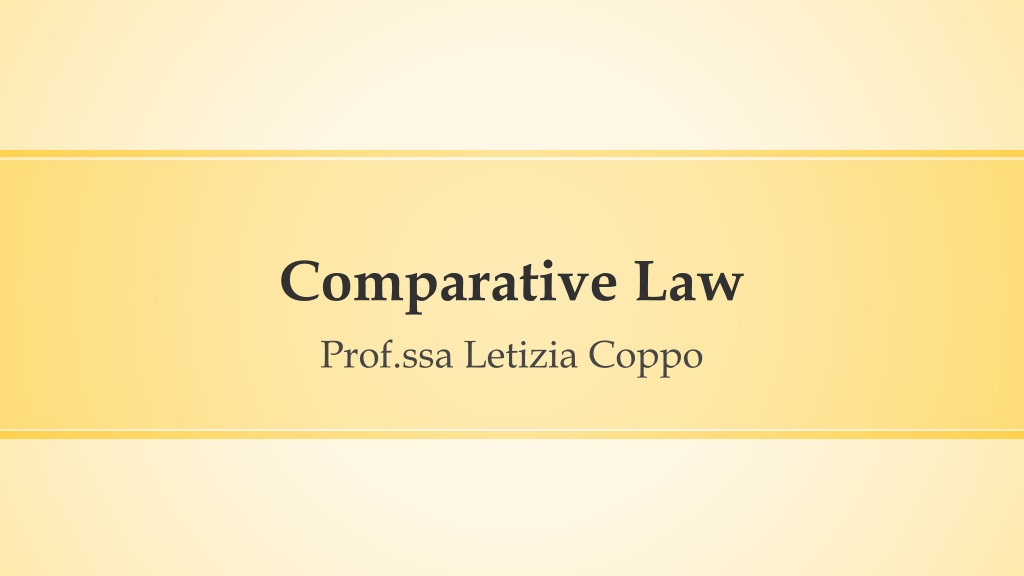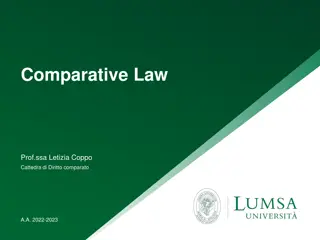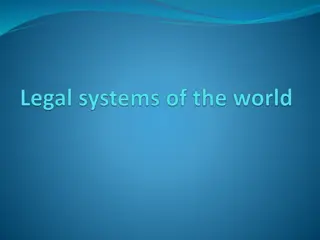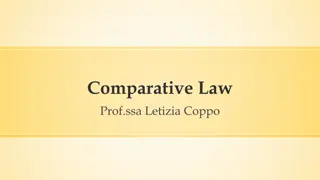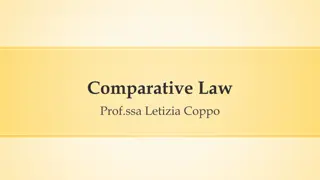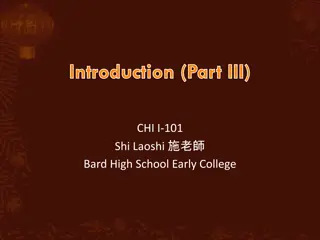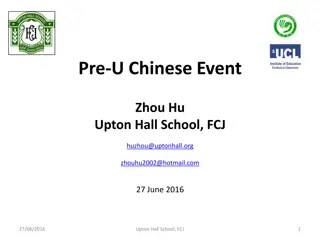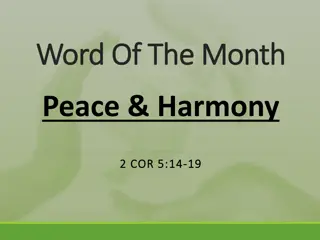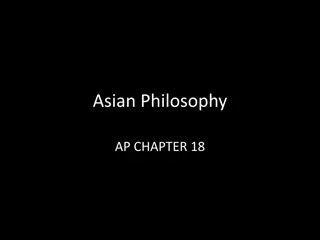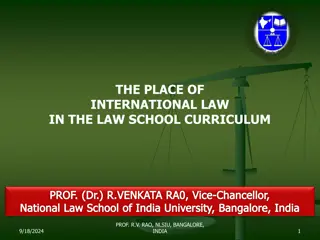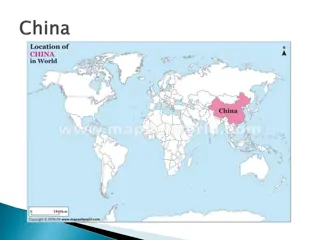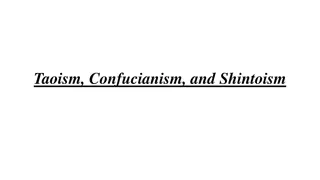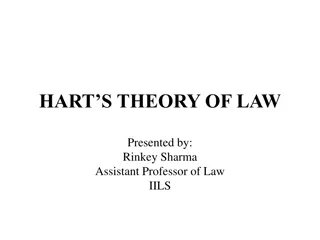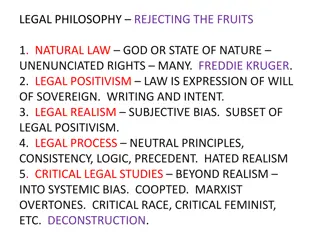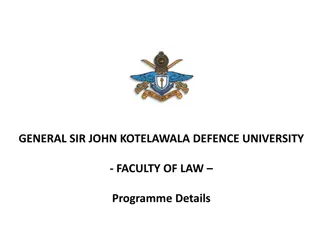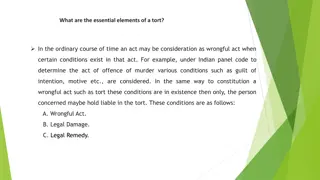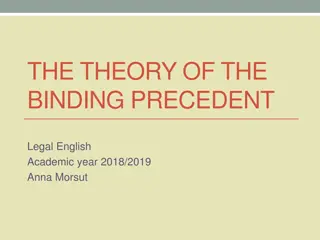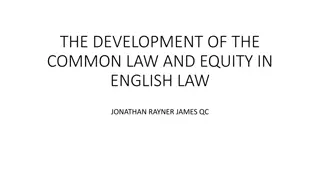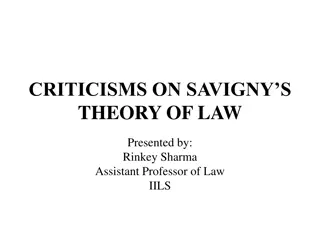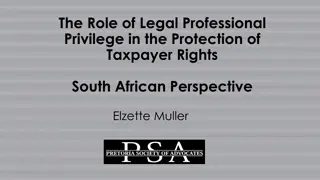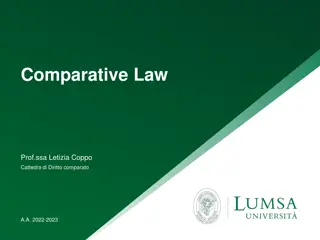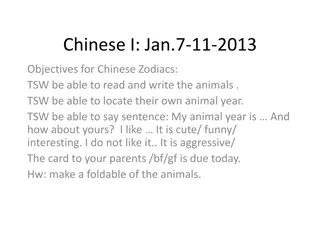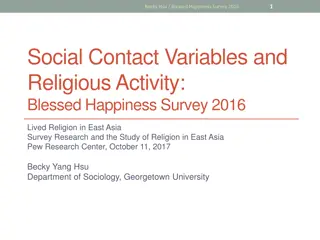Chinese Law: A Historical Perspective on Harmony and Legal Principles
Chinese law reflects a unique approach to social order and harmony deeply rooted in Confucian teachings. The concept of cosmic harmony and the emphasis on societal roles are central to understanding the legal framework in ancient China. Legal principles such as Li and Fa governed social behavior based on individual status and relationships. Litigation was discouraged in favor of compromise, reflecting the cultural values of modesty and harmony. However, political conflicts in ancient China led to ideological clashes between Confucianism and Legalism.
Download Presentation

Please find below an Image/Link to download the presentation.
The content on the website is provided AS IS for your information and personal use only. It may not be sold, licensed, or shared on other websites without obtaining consent from the author. Download presentation by click this link. If you encounter any issues during the download, it is possible that the publisher has removed the file from their server.
E N D
Presentation Transcript
Comparative Law Prof.ssa Letizia Coppo
LAW IN THE FAR AND MIDDLE EAST Chinese, Hindu and Islamic Law
CHINESE LAW No struggle for law and no belief that important questions of social life should primarily be regulated by rules of objective law. Social relations are part of the natural order, in line with the doctrines of Confucianism (551-479 b.C.). The restoration of cosmic harmony is the paramount goal even in dispute resolution.
CHINESE LAW Tung Chung-Shu s doctrine of cosmic harmony: man and the Divine, Heaven and Earth, all living creatures are organic parts of a harmoniously ordered and integrated universe. The most important goal of mankind is to preserve or restore such harmony: no I win, you lose logic, but win- win or joint gain logic.
CHINESE LAW Sources of law Li = the rules of proper behaviour; their content depend upon the social status of the person to whom they applied, i.e. his status in the family, in the clan, in the neighbourhood, in the official hierarchy and in the State. Fa = legislation
CHINESE LAW Ideal Confucian man the person conscious of the natural order of the world who recognises the necessity and purpose of the rules of behaviour expressed by the Li, follows them spontaneously and repressed modestly and quietly his own interests in the pursuit of general harmony.
CHINESE LAW Approach towards litigation Anyone who disturbed social tranquillity by addressing a State court and trying to put a fellow-citizen publicly in the wrong was regarded as uncultivated person who lacked the cardinal virtues of modesty and propensity to compromised solutions. a disruptive, boorish and
CHINESE LAW Political conflicts In 479 b.C. the country was divided by armed conflicts among local princes. The school of Legists prevailed over the Confucian one and imposed its ideology, which was opposed to the one of Confucianism.
CHINESE LAW Confucians v. Legists Confucians believed that men were inherently good natured and could be brought to virtue by education and by the example of the rulers. Legists believed that men were inherently bad and selfish, therefore needed strict discipline.
CHINESE LAW Confucians v. Legists Confucians believed that all men should be treated according to their status, i.e. their place in the world. Legists believed that all men are equal before the law and that the proper behaviour should be taught through severe criminal sanctions.
CHINESE LAW The Ts in dynasty and the triumph of Legists (221 b.C.) The dynasty took power and established a strong centralised administration, enacted draconian statutes and imposed fearful burdens on the population. The dynasty pursued Confucian followers and burnt their writings.
CHINESE LAW The Han dynasty and the re-rise of Confucianism (206 b.C.) The Han dynasty took power and restored Confucianism as the official ideology of the Empire. The ideology was spread across the country by travelling disciples. Reading of the Confucian classics became crucial for education.
CHINESE LAW The Han dynasty and the re-rise of Confucianism (206 b.C.) A state examination was introduced for every step of the carrier path in the mandarinate, of Confucianism was a paramount part. which the knowledge of This contributed to the birth of a class of highly educated imperial magistrates, crucial for the administrative organisation.
CHINESE LAW Legislation the Fa Confucians admitted that legislation was a necessary evil. Several codes were enacted, most of all to regulate criminal and administrative law. The codes reflected the Confucian ideals: e.g. accurate gradation of penalties in relation to the status of the victim and the guilty.
CHINESE LAW The judiciary State courts held by imperial officers in the capital cities of the provinces or regions: not often used, also because procedures were long and expensive and judges had the reputation of being lazy and corrupt. At a local level, the most prominent or wise persons in the community served as conciliators.
CHINESE LAW Modern China Unbalanced treaties with Western countries. Kuomintang party codified the whole private law following the example of Japan and drawing inspiration from the Swiss and German law (1926-1928). Establishment of the People s Republic of China (1949): the first act was the abrogation of the Kuomintang legislation as too Western in spirit.
HINDU LAW Hindu law applies to all persons that are Hindus regardless the nationality or domicile, i.e. all who accept the complex mass of religious, philosophical and social ideas referred to Hinduism. Hindu law applies to all people racially derived from the the population of India except adherents of the Islamic, Christian, Jewish or Parsee religions.
HINDU LAW It is a religion-based legal family, but Hinduism does not require its members to accept particular religious doctrines about God and soul, creation and redemption; it was open to the people to believe in one divinity or another. Hinduism encompasses a plurality of different rituals, but lacks a definite and uniform theological doctrine, though it offers a certain set of basis convictions of a religious or philosophical nature that are accepted by the majority of Hindus.
HINDU LAW Fundamental belief: the doctrine of soul migration (Kharma), according to which the after life was influenced by the actions of the past life. Cast system: a corpus of rules that regulate the duties and conduct towards other cast members and towards other casts. The casts were ruled by the principle of purity: see the delicate problem of the paria , i.e. outcasts.
HINDU LAW Main casts 1. Brahmins = priests or highly educated people 1. Kshatriyas = warriors 1. Vaishyas = tradesmen 2. Sudras = servants and craftsmen
HINDU LAW Primal sources of law Veda: ancient books containing religious songs, prayers, hymns and sayings recorded in different times. Smritis: law books recollecting the reminded wisdom of ancient priests and scholars. Dharmasutras: set of rules for the cast members.
ISLAMIC LAW Another religious legal family is the Islamic one [see Annex A to the lesson]. Sources 1. Koran = the revealed law, eternal and unchangeable 2. Sunna = customary law 3. Igma = consensus reached by the Islamic community 4. Qiyas = analogy
